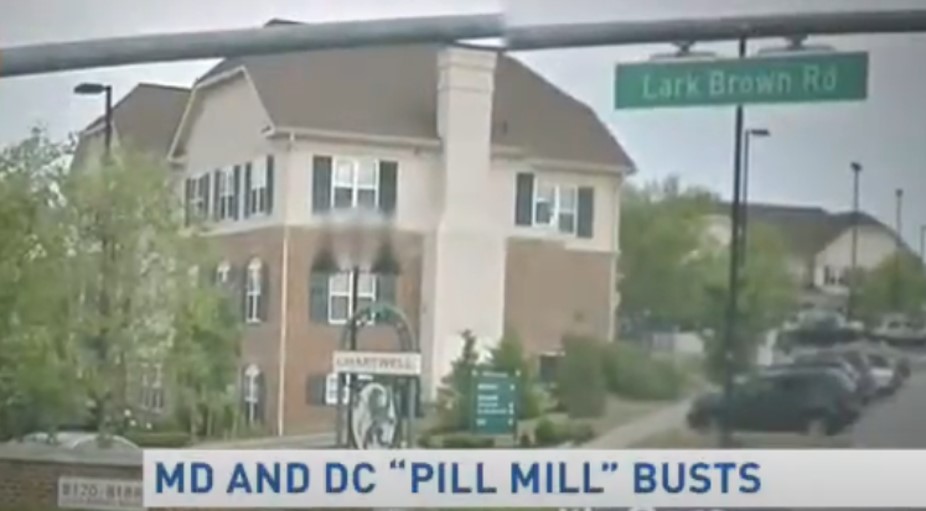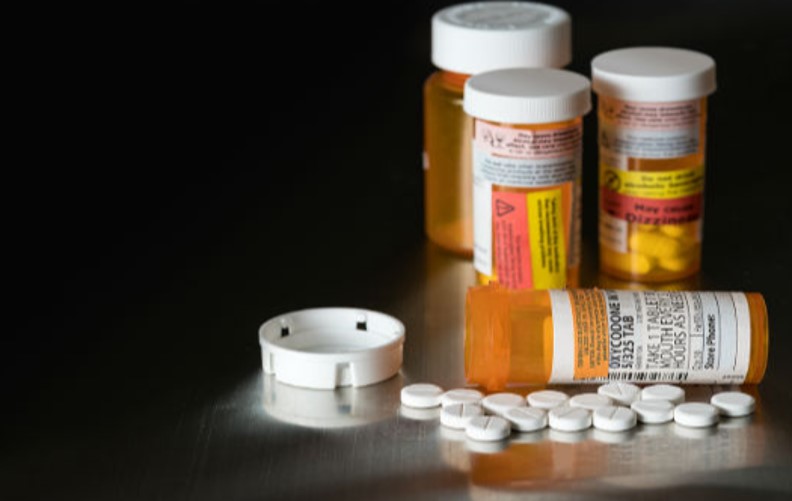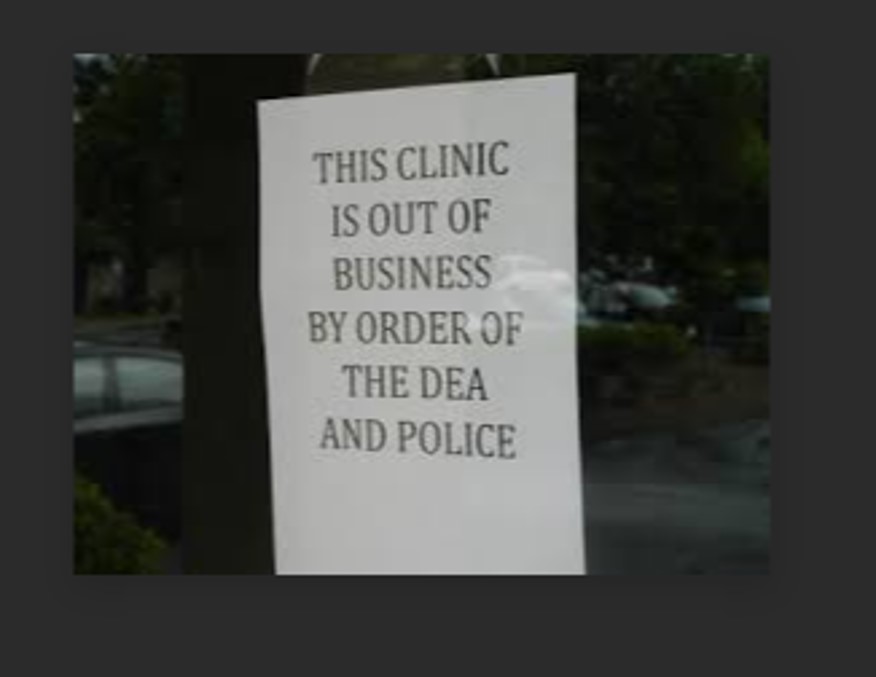
State and federal authorities are cracking down on Pain Management Doctors and Other Practitioners unlawfully writing prescriptions for high volumes of oxycodone and other pharmaceutical drugs outside the bounds of normal medical practices.
Doctor Charged for Unlawfully Distributing Opioids (U.S. Department of Justice, April 2023)
According to court documents, Dr. Ndubuisi Joseph Okafor, 63, of Upper Marlboro, Maryland, allegedly distributed oxycodone to individuals outside the usual course of professional practice and without a legitimate medical purpose from his medical practice in Washington. Okafor allegedly performed only cursory evaluations of individuals and further solicited and received cash inside the examination rooms of his clinic in exchange for opioid prescriptions.
An indictment is merely an allegation. All defendants are presumed innocent until proven guilty beyond a reasonable doubt in a court of law.
IMPORTANT NOTE: Not all pain management clinics are engaged in criminal activity. Many clinics across the state operate legally and employ trained personnel and doctors who treat patients who legitimately suffer from pain.
The Justice Department alleged that, from 2017 onward, Mr. Beckman and his employees ignored red flags and filled prescriptions while knowing they were illegitimate, violating the Controlled Substances Act. The dosages of opioids given out by Beckman’s Pharmacy were far larger than recommended, the government claimed. Patients could pay cash for their medicine even when they had prescription insurance.
Part of these order fills included prescriptions for combinations of drugs that are not medically legitimate and are sought by drug users for recreational purposes.
More than 10 patients died within 10 days of getting their prescriptions filled at Beckman’s Pharmacy, according to the Justice Department.
TOWSON, MARYLAND. Dr. Norman Rosen, age 84, pleaded guilty to conspiracy to distribute and dispense oxycodone in connection with his operation of Rosen-Hoffberg Rehabilitation and Pain Management Associates, P.A., where he was Medical Director and Part Owner.
According to his guilty plea, Norman Rosen was a doctor licensed to practice medicine in Maryland. Rosen’s partner in the business and the Practice’s Associate Medical Director was Howard Hoffberg.
According to Dr. Rosen’s guilty plea, patients were often prescribed high doses of oxycodone and other opioid medications. Some patients were issued prescriptions for opioids after routinely providing aberrant urine toxicology screens, including positive results for cocaine, heroin, and other street drugs; positive results for controlled substances that were not prescribed by the practice (which indicated the patient was likely buying medications off the street or was doctor-shopping); and/or negative results for the controlled substances prescribed by the practice (which indicated prescribed substances were either not taken, being consumed too quickly, or sold by the patients).
Dr. Rosen knew that the practice received complaints about the behavior of patients, including reports of suspected drug transactions in the parking lots near the practice. At times, patients were observed “nodding out” in the waiting area. Some patients tried to bring in urine that was not theirs in order to pass urine toxicology screens. Some patients overdosed, some of these patients required hospitalization, and some died.
Several major pharmacies refused to fill any prescriptions issued by the practice because of the high doses being prescribed. Both Rosen and Hoffberg were aware of the conditions at the practice and yet continued to prescribe medications to these patients.
Assistant U.S. Attorney Jason Medinger called the numbers eye-popping, saying, “This was out of control.”
As detailed in his plea agreement, as the Medical Director, Dr. Rosen established the rules for the practice. One of his rules was that the customer, i.e., the patient, is always right. Sometimes, when other providers at the practice discharged certain patients, Rosen continued to treat the patients at the Towson location. At times, if a patient failed a urine toxicology screen because of illicit substances in their system, such as heroin or cocaine, Dr. Rosen declined to discharge the patient and instead required the patient to return to the practice more frequently for follow-up, sometimes as much as three times a week.
Dr. Rosen admitted that he issued prescriptions to some patients outside the bounds of the usual medical practice and not for a legitimate medical purpose. For example, Dr. Rosen prescribed large doses of oxycodone and clonazepam to a patient who had eight toxicology screens that were positive for cocaine and whose children had been taken from her because of her drug problems. Similarly, Rosen ignored the red flags and prescribed oxycodone and methadone to a patient who admitted to illicit drug use, had previously been criminally charged for prescription fraud and drug trafficking, had overdosed, had urine toxicology screens that were positive for heroin, cocaine, and marijuana; and had been accused of selling her pills. Rosen faced a maximum of 20 years in prison.
“I took patients other doctors rejected,” Dr. Rosen said. “I’m very sorry for any pain that may have occurred.”
Dr. Rosen’s partner, Howard Hoffberg, age 65, of Reisterstown, Maryland, pleaded guilty to conspiracy to violate the anti-kickback statutes in connection with a scheme to accept payments from a pharmaceutical company in exchange for prescribing a fentanyl-based drug. He was sentenced to eight months in federal prison. Also, a physician’s assistant, William Soyke, age 69, of Hanover, Pennsylvania, pleaded guilty to conspiracy to distribute and dispense oxycodone, fentanyl, methadone, and alprazolam and was sentenced to 37 months in federal prison.
United States Attorney Erek L. Barron commended the FBI, the DEA, HHS-OIG, and the Baltimore County Police Department for their work in the investigation.
What is Oxycodone and How Is It Used (United States Drug Enforcement Administration)

GREENBELT, MARYLAND. Justina Aburime, age 53, of Bowie, Maryland, pleaded guilty to one count of conspiracy to distribute and dispense oxycodone and one count of distribution and dispensing of oxycodone.
According to her guilty plea, from February 2017 to February 2020, Aburime conspired with others, including Thomas Charles Johnson, to distribute and dispense oxycodone outside the scope of professional practice and not for a legitimate medical purpose at Personal Touch Medical Spa, LLP, a Largo, Maryland pain management clinic.
As licensed and registered nurse practitioners under the Drug Enforcement Administration and the state of Maryland, Aburime and Johnson were legally authorized to prescribe controlled substances for legitimate medical purposes.
During her employment with PTMS, Aburime wrote oxycodone prescriptions without a legitimate medical need and outside the scope of professional practice. Aburime allowed an unauthorized person to write oxycodone prescriptions using her medical credentials. Specifically, Aburime allowed PTMS’s owner—who was not authorized to prescribe controlled substances—to prescribe oxycodone to individuals using pre-signed blank prescriptions bearing Aburime’s name and DEA registration number.
In some instances, Aburime was traveling outside the United States at the time of treatment or did not see the patient who was prescribed oxycodone using her credentials. Further, Aburime agreed that she prescribed oxycodone to patients when there was no legitimate need and without considering alternative treatment options. Aburime also agreed that she increased oxycodone dosage over time without a medical justification.
Baltimore Doctor Accused of Running Pill Mill, Flooding Streets with Oxycodone (WJZ, YouTube Video)
What Are Pill Mills?
According to the National Drug Intelligence Center, an estimated 7,500 pill mills operate in the United States. A pill mill is a type of business that prescribes narcotic medications in more significant numbers than would be prescribed in regular physician offices. State and local investigators came up with the name “pill mills.”
Pill mills are places where people can get prescription drugs without a legitimate medical reason. In most cases, pill mills are run by doctors or other healthcare professionals who prescribe drugs like opioids for cash. These prescriptions are often given without any medical exam or testing, and they’re usually offered in large quantities. Pill mills fuel the opioid epidemic by making it easy for people to get their hands on these dangerous drugs.
Often, these operations are in rural areas or small towns without many healthcare options. This means that people have to travel long distances to get to a pill mill, making it even easier for them to become addicted to the drugs they’re prescribed.
Pill mills are often located in storefronts or strip malls and usually don’t have any medical equipment on site. In some cases, people who work at pill mills may even dress like they’re not in a medical setting. This can make it difficult for people to know if they’re going to a legitimate doctor’s office or a pill mill.

If you suspect a medical office may be a pill mill, it’s important to report it to the authorities. You can submit your anonymous tip through the DEA online Tip Line and report the doctors or facility.

BALTIMORE, MARYLAND – A criminal complaint charged the manager of a pain clinic, her boyfriend, and several customers with conspiracy to distribute controlled substances, including oxycodone and oxymorphone. The defendants charged in the criminal complaint were:
Monica Raynette Clark, age 31, of Waldorf, Maryland;
Michael Tyrone Scott III, age 28, of Waldorf, Maryland;
Larry Nathaniel Waller, age 48, of Williamson, West Virginia;
Mildred Taylor, age 67, of Stephenson, West Virginia;
Jason James Johnson, age 41, of Kermit, West Virginia, and
Lisa Ann Lewis, age 41, of Smithsburg, Maryland.
“State and federal authorities are working to shut down ‘pain clinics’ that are really just fronts for criminals who divert pharmaceutical drugs and hook a new generation of addicts,” said Acting U.S. Attorney Jonathan F. Lenzner. “Those who irresponsibly write opioid prescriptions are acting like street-corner drug pushers. We are determined to reduce the number of opioid overdose deaths here in Maryland.”
“The operation of a drug trafficking network peddling prescription drugs for profit under the guise of a medical practice not only violates the law, it undermines the public confidence in the healthcare profession,” said James A. Dawson, Special Agent in Charge of the FBI’s Washington Field Office Criminal Division. “The FBI and our partners will continue to combat the illegal distribution of opioids, at all levels, through our investigations of those who seek to profit from this activity.”
According to the affidavit filed in support of the criminal complaint, law enforcement obtained evidence that drug trafficking was occurring at two pain clinics—Memorial Care Center, located in Woodbridge, Virginia, and Washington DC Spine Center, which closed in August 2019. Clark was the office manager of Memorial Care and was previously the office manager of WDC Spine. Clark was not a physician and had no Drug Enforcement Administration registration number. The criminal complaint alleges that, since Clark was not authorized to prescribe controlled substances, she forged prescriptions for opioids using prescription pads from the clinics’ doctors, then illegally sold the forged opioid prescriptions to opioid users and diverters, including customers who lived in Maryland, Virginia, and West Virginia, such as Waller, Taylor, Johnson, and Lewis. Clark was allegedly in a romantic relationship with Scott, who assisted Clark in selling the forged prescriptions.
As detailed in the criminal complaint affidavit, the investigation revealed that Waller, Johnson, Taylor, and Lewis were customers of Clark who purchased opioid prescriptions for themselves and others. Law enforcement allegedly discovered text messages between Clark and Waller, Johnson, Taylor, and Lewis arranging for the purchase of forged opioid prescriptions. For example, the complaint alleged that from July 2019 to April 2021, more than 40 prescriptions were filled in Johnson’s name that were purportedly signed under the name of a Memorial Care and/or WDC Spine doctor.
The affidavit alleged that in an effort to evade scrutiny by law enforcement, Clark used several different phones to sell prescriptions and instructed customers to use specific pharmacies to fill prescriptions. For example, Clark allegedly advised Taylor to fill prescriptions at a pharmacy “in Woodbridge… as long as everybody has a West Virginia ID or Virginia ID,” as Clark was purportedly aware that pharmacies had begun to refuse opioid prescriptions from Memorial Care. The criminal complaint further alleges this was in relation to an order of prescriptions for more than 20 individuals.
The criminal complaint further alleges that Clark instructed an undercover agent to claim a fictitious work injury to receive a professional recommendation for opioid use. For example, Clark allegedly stated, “When you get a free second, go to the emergency room. Tell them you had an accident at work… tell them you are having numbness and tingling in your leg and your foot. That warrants.” Further, the complaint alleges that Clark later arranged to sell forged prescriptions to the undercover agent. Clark and the undercover agent exchanged conversations in which Clark detailed meeting dates and times, the price for forged prescriptions, and a deviance in sales methodology as clients began to be compromised by police.
BALTIMORE, MARYLAND –Tormarco Harris, 32, of Baltimore, was sentenced to 20 years in prison without the possibility of parole. Harris was indicted in August 2017 along with nine other individuals for their role in a scheme to operate two pill mills in Baltimore City and Glen Burnie. Each of Harris’ co-defendants—which included a doctor and two nurse practitioners who prescribed opiates without legitimate medical purpose—pleaded guilty.
“Harris’ sentencing under the drug kingpin statute keeps him behind bars for a long time,” said Attorney General Frosh. “He dealt deadly prescription drugs using pain management as the façade. He was just as dangerous as a heroin dealer on the street corner. Today’s sentencing sends a strong message that our office and law enforcement partners will seek the harshest penalties to keep more people from dying of opioid abuse.”
“Today’s sentencing sends a clear message that health care fraud and diversion of these too often deadly drugs will not be tolerated,” said Special Agent in Charge Maureen R. Dixon, Office of Inspector General for the U.S. Department of Health and Human Services. “We will continue to work with our law enforcement partners to protect taxpayer funds and keep the public safe from these poisonous drugs.”
“The sentence handed down today shows that doctors and other practitioners are not the only ones that are being held responsible for the proliferation of opiates that have flooded our streets and have caused an unprecedented amount of addiction,” stated Assistant Special Agent in Charge Don Hibbert, Drug Enforcement Administration Baltimore District Office.
“The owners and operators of “pill mills” disguised as pain management clinics should be put on notice that they will also be held accountable to the fullest extent possible.”
Following a bench trial in August, Harris was convicted on all counts in a 21-count superseding indictment. Specifically, Judge Wachs convicted Harris of one count of violating Maryland’s drug kingpin statute, one count of conspiring to distribute controlled dangerous substances, 18 counts of distributing controlled dangerous substances, and one count of conspiracy to maintain a common nuisance.
According to evidence admitted at Harris’ trial, Harris and Dr. Shaw-Taylor owned and operated Starlife Wellness Center in Glen Burnie, Maryland. From June 2015 through August 2017, Harris and Dr. Shaw-Taylor operated Starlife as a pill mill, where, in exchange for cash, patients received unlawful prescriptions for large quantities of narcotics, including oxycodone, morphine, tramadol, and benzodiazepine. Evidence admitted at trial also established that patients paid as much as $500 in cash for their illegal prescriptions; on certain occasions, co-conspirator medical professionals working at Starlife were pressured to change prescriptions to prescribe higher quantities of narcotics to their patients; co-conspirator medical professionals wrote unlawful prescriptions for high volumes of oxycodone and other drugs to Harris and one of his relatives.
When law enforcement executed a search warrant at Harris’s home in August 2017, they found a large amount of cash, prescription pads, a cash counting machine, and numerous letters from national pharmacy chains placing Harris on notice of the problematic prescription practices at Starlife.
Beginning as late as June 2015, Harris and Dr. Shaw-Taylor also operated Westside Medical Group, located in Baltimore City, in a similar fashion until it was raided by law enforcement. Patients paid as much as $450 in cash for their illegal prescriptions; prescriptions were being written by individuals without any medical qualifications to do so; prescriptions were being written for high volumes of oxycodone and dangerous combinations despite ample evidence in patient files of ongoing substance abuse issues and/or diversion.
Co-defendant Happiness Aguzie pleaded guilty to one count of Conspiracy to Distribute Controlled Dangerous Substances and one count of felony Medicaid Fraud. Aguzie was sentenced to a 10-year prison sentence with all but 3 years suspended. Aguzie was a licensed, certified Registered Nurse practitioner who held a Maryland medical license and a registration number with the U.S. Drug Enforcement Administration (DEA). Similar to a medical doctor, Aguzie was qualified in Maryland to prescribe controlled dangerous substances. As a Medicaid provider, Medicaid would have unwittingly paid Aguzie for certain otherwise approved costs associated with the scheme. Aguzie was employed at both Starlife Wellness Center and Westside Medical Group and routinely wrote prescriptions for opioids in high doses and in high pill counts that were not for legitimate medical purposes.
Co-defendant Minnie Ndem pleaded guilty to one count of Conspiracy to Distribute Controlled Dangerous Substances. Ndem was sentenced to a 10-year prison sentence with all but 18 months suspended. Ndem was a licensed, certified Registered Nurse practitioner who held a Maryland medical license and a registration number with the DEA. Similar to a medical doctor, Ndem was qualified in Maryland to prescribe controlled dangerous substances. Ndem was employed at Starlife Wellness Center from March 2016 until April 2017 and routinely wrote prescriptions for opioids in high doses and in high pill counts that were not for legitimate medical purposes. While employed at Starlife, Ndem also prescribed controlled, dangerous substances to co-defendant Harris.
Co-defendant J. Alex McClary Green pleaded guilty to one count of Conspiracy to Distribute Controlled Dangerous Substances and one count of felony Medicaid Fraud. Green was sentenced to a 10-year prison sentence with all but 9 months suspended. Green was a licensed Clinical Drug and Alcohol Counselor and/or clinical professional counselor. Green worked at both Westside and Starlife from June 2015 until February 2017, providing drug and alcohol counseling to individuals receiving prescriptions for opioids. While employed at Starlife and Westside, Green would write prescriptions for opiates for himself and other individuals even though he was not qualified to prescribe controlled dangerous substances. Many of the individuals that Green would fill out prescriptions for were Medicaid recipients such that Medicaid would have unwittingly paid for the cost of the prescriptions.
Co-defendant Kwame Asafo-Adjei pleaded guilty to one count of Conspiracy to Commit Medicaid Fraud. Asafo-Adjei was sentenced to a 5-year prison sentence with all but 30 days suspended. Asafo-Adjei was an Attorney barred in the District of Columbia since 2011. Asafo-Adjei worked at Westside from as late as December 2016 through April 2017. Asafo-Adjei had no medical training and was not qualified to prescribe controlled dangerous substances. Nevertheless, Asafo-Adjei filled out prescriptions for individuals seeking opiates at Westside on numerous occasions. Many of these individuals were Medicaid beneficiaries such that Medicaid would have paid for the prescriptions filled out by Asafo-Adjei.
Co-defendant Sabina Acquah pleaded guilty to one count of felony Medicaid Fraud. Acquah was sentenced to a 5-year prison sentence. Acquah was the Owner of Premier Medical Practice Solutions. Her sole client was defendant Dr. Shaw-Taylor, a longtime friend. Acquah submitted numerous fraudulent claims to Medicaid arising from the distribution of controlled dangerous substances at Westside.
Co-defendant Lisa Diehl pleaded guilty to one count of Conspiracy to Distribute Controlled Dangerous Substances. Diehl was sentenced to a 5-year prison sentence. Diehl was the Office Manager at Westside and worked at the locations from December 2016 through March 2017. While working at Westside, Diehl took cash from individuals in amounts of as much as $450 in exchange for prescriptions that she knew had been completed by individuals who were not qualified to prescribe controlled dangerous substances.
Co-defendant Monique Ford pleaded guilty to one count of Conspiracy to Commit a Theft Scheme. Ford was sentenced to 3 years, which was suspended in its entirety. Ford was a licensed Certified Nursing Assistant and had been licensed as a medical technician. Ford worked at Westside from October 2016 through April 2017 and was placed there by a third party. Ford provided individuals seeking opiate prescriptions that were filled out by individuals not qualified to prescribe controlled dangerous substances, such as co-defendant Asafo-Adjei, a lawyer.

OXON HILL, MARYLAND –Donald Russell, age 53, of Waldorf, Maryland, was sentenced to five years in prison, followed by three years of supervised release for his participation in a drug conspiracy in connection with the operation of purported pain management clinics that were actually “pill mills.”
According to court documents, “pill mills” routinely engage in the practice of prescribing and dispensing controlled substances, primarily oxycodone, outside the scope of professional practice and without a legitimate medical purpose. The owners kept the profits from the pill mill operations and the sales of oxycodone in cash. According to the indictments, the owners recruited “distributors” and “runners” to visit their clinics so that they would profit from the cash fees charged for an office visit. Runners are recruited – usually by a distributor – to enter pill mill clinics with fictitious complaints of pain in order to obtain prescriptions for oxycodone and other controlled substances. Typically, runners filled the prescription and gave the oxycodone tablets they received to the distributor. Runners were typically paid in either cash or oxycodone tablets for their services. The distributors then generally sold the pills for a profit.
The indictments allege that the owners of the pill mill clinics required runners to have certain paperwork, generally an MRI report and a prescription history, which would be kept in the patient’s file to support a false claim that there was a medical need for the prescription of oxycodone.
The owners or other conspirators created false paperwork for runners who were unable to obtain MRI reports or prescription histories that would provide a basis for requesting a prescription for oxycodone. Conspirators took steps to circumvent the state prescription drug monitoring programs (PDMPs) to ensure that runners and distributors would not be prevented from obtaining multiple prescriptions from different doctors at the same time. For example, conspirators directed distributors and runners to fill prescriptions in Washington, D.C., which did not have an active PDMP, or in states other than Maryland that had active PDMP systems (such as Delaware and Virginia) because individual state PDMPs were not connected so prescriptions filled in those states would not show up in the Maryland PDMP system. Members of the conspiracies also kept track of which pharmacies had supplies of oxycodone and were willing to fill prescriptions for runners.
According to the plea agreement, from February 2014 through May 2015, Russell and co-defendant Bruce Kevin Lewis, age 52, of Deale, Maryland, owned and operated PG Wellness Center, LLC (PG Wellness), and A Plus Pain Clinic, LLC (A Plus Pain), purported pain management clinics located in Oxon Hill, Maryland and Washington, D.C., respectively. PG Wellness and A Plus Pain were actually pill mills.
Russell worked with at least 62 different individuals who visited the clinics to obtain illicit oxycodone prescriptions. These included co-defendants Melissa Catlett, Terrell Downing, John Fields, Ronald Kans, Robert Long, Walter Moffett, Ronald Rust, Danielle Silberstein, Peter Snyder, and Ronald Tennyson.
According to the plea agreement, on or about October 31, 2014, Russell and Lewis discussed the profits reaped that month from their clinics: $4,400 – 4,500 from A Plus Pain and $48,000-50,000 from PG Wellness. They talked about hiding the money and discussed methods that regulatory authorities had used when examining other pill mill clinics.
Throughout the conspiracy, Russell distributed at least 2,307,000 milligrams (2,307 grams) of oxycodone.
This indictment charged the following individuals with conspiracy to distribute and possess with intent to distribute oxycodone:
Donald Russell, 51, of Waldorf, Maryland
Bruce Kevin Lewis, 52, of Deale, Maryland
Danielle Silberstein, 31, of Waldorf, Maryland
Peter Snyder, 34, of Ocean City, Maryland
Robert Long, 34, of Mechanicsville, Maryland
Jamie Davis, 28, of LaPlata, Maryland
Ronald Tennyson, 32, of Mechanicsville, Maryland
Terrell Downing, 25, of New Carrollton, Maryland
John Fields, 62, of Temple Hills, Maryland
Ronald Rust, 44, of Alexandria, Virginia
Ronald Kans, 41, of LaPlata, Maryland
Walter Moffett, 51, of Chestertown, Maryland
Melissa Catlett, 38, of King George, Virginia
According to the indictment, PG Wellness and A Plus Pain were pill mills. The indictment alleges that defendants Silberstein, Snyder, Long, Downing, Rust, Kans, and Moffett acted as distributors who brought many runners to the clinics. Davis and Tennyson allegedly were runners and worked with Long to fund additional visits to pill mill clinics and distribute the pills obtained during those visits. According to the indictment, Fields was a runner who dealt directly with Russell to obtain oxycodone pills and distribute them. Co-defendants Silberstein and Catlett regularly purchased bulk quantities of oxycodone pills from Russell.
Drug Enforcement Administration Washington Field Division. Baltimore Police Department
Related Cases in Maryland
U.S. v. Mori and Dalton, Criminal No. 15-0287–
ELKRIDGE, MARYLAND. This indictment charges Alex Mori, age 29, of Nanjemoy, Maryland, and Thomas Dalton, age 29, of Waldorf, with conspiracy to distribute and possess with intent to distribute oxycodone. The indictment alleges that from November 2013 through May 2015, Mori and Dalton operated First Priority Health Care, LLC, a purported pain management clinic in Elkridge, Maryland. According to the indictment, First Priority was a pill mill. The indictment also sought the forfeiture of $600,000 and property in Nanjemoy, Maryland. This estimates that, during one month of operation, First Priority would see at least two hundred patients, each receiving at least 100 oxycodone 30 mg pills, a total of 20,000 pills. The street value of each pill was estimated at $30 per pill, the equivalent of $600,000.
Official Announce Indictments in Maryland and D.C. Region Pill Mill Bust (ABC7News, YouTube Video)
U.S. v. Joyce Vercauteren, Criminal No. 15-284 –
GREENBELT, MARYLAND. This indictment charges Joyce Vercauteren, age 41, of Clinton, Maryland, with conspiracy to distribute and possess with intent to distribute oxycodone. According to the indictment, from May 2014 through May 2015, Vercauteren owned and operated MPC Wellness Center, a purported pain management clinic. The indictment alleges that, in reality, MPC Wellness operated as a “pill mill.” The indictment sought the forfeiture of $1,200,000 and a vehicle. This estimates that, during one month of operation, MPC Wellness would see at least four hundred patients, each receiving at least 100 oxycodone 30 mg pills, a total of 40,000 pills. The street value of each pill is estimated at $30 per pill, the equivalent of $1,200,000.
The defendants in all three indictments faced a maximum sentence of 20 years and a $1 million fine for the drug conspiracy.
Rogue pain management clinics (pill mills) are a significant source of pain pills available to abusers. Investigations indicate that pill mill operations exhibit several unique characteristics, such as the ability of operators to relocate quickly, nearly exclusive associations with specific physicians and pharmacies, primarily cash-based payment methods, and rapid examinations.
Owners of pill mills have established many cash-only operations that distributors frequently use. Moreover, many of these out-of-state distributors and abusers work in teams. These individuals or teams frequently follow a route that traverses the eastern, southern, and western regions before returning north. Some arrange shipments to other states through parcel delivery services.
Pill mill operators continually devise methods to subvert regulations and investigations while attracting patients. For example, law enforcement or regulatory investigations have closed pill mills and suspended the licenses of the associated physicians only to have the owners reopen the business at a new location staffed by other licensed physicians. In addition, physicians are increasingly opening pill mills disguised as wellness centers, functional medicine clinics, and urgent care centers.
If you are aware of controlled substance violations in your community, you can submit your anonymous tip through the DEA online Tip Line.
In Pain Killer, Barry Meier tells the story of how Purdue turned OxyContin into a billion-dollar blockbuster. Powerful narcotic painkillers, or opioids, were once used as drugs of last resort for pain sufferers. But Purdue launched an unprecedented marketing campaign claiming that the drug’s long-acting formulation made it safer to use than traditional painkillers for many types of pain. That illusion was quickly shattered as drug abusers learned that crushing an Oxy could release its narcotic payload all at once. Even in its prescribed form, Oxy proved fiercely addictive. As OxyContin’s use and abuse grew, Purdue concealed what it knew from regulators, doctors, and patients.

The opioid crisis and drug overdoses continue to devastate our states and local communities.
Donations to Support this Website are Always Welcome.
These cases serve as an important reminder that healthcare professionals have a duty to prescribe medication responsibly to ensure the well-being of patients under their care. Failing to do so can endanger patients and undermine critical, ongoing public health measures to address the illegal distribution of opioids.
Related Investigations
How Authorities Are Cracking Down on Virginia Pain Clinics Massive Pain Killer Pill Operations
How Authorities Have Shuttered Georgia Pain Clinics Massive Pain Pill Distribution
How Authorities Are Shutting Down Texas Pain Clinics Enormous Pill Prescriptions
How Authorities Are Cracking Down on Rogue Pain Clinics in Florida
How Pain Clinic Owners Turned Patients’ Pain into Enormous Profits
How to Recognize a Pain Pill Mill in Your Community
Authorities Crack Down on Pharmacists Fulfilling and Dispensing Massive Amounts of Pain Pills
How State and Federal Authorities are Dismantling Pill Mills in the United States

How Federal Agencies Are Shutting Down Maryland Pain Clinics Operating as Pill Mills
ADD COMMENTS BELOW
- Essential Christmas Songs for the Holiday Season
- Stylish Outdoor Fire Pits and Patio Heaters
- How to Create an Ergonomic Workspace at Home or Work
- Benefits of Humor and Laughter in Life
- Balancing Success: Practical Self-Care Strategies for Entrepreneurs
- Guides to Backpacking, Mountain Biking and Hiking Georgia
- Ways to Pay It Forward and Change Lives
- Email Marketing Campaigns for Small Business Owners
- Guide to Martha Stewart’s Hugely Successful Concept and Art of Presentation
- Guides to Backpacking and Hiking Canada
- Timeline of Events Leading to Rudy Giuliani’s Legal Troubles
- Backpacking, Hiking, and Camping Safety Guides
- Moving and Relocating to Atlanta: How to Find Your New Home
- Money Matters: Insider Tips to Buying a Home
- Renting vs Owning a Home
- Ways to Build Positive Credit
- Do It Yourself Credit Improvement Process
- A Trail of Clues to the Murder of Nicole Brown Simpson
- How Centra Tech’s Bitcoin Cryptocurrency Scheme Was Hatched and Discovered
- Starting a New Business as a New Mother: Tips for Thriving
- Guides to Backpacking and Hiking the Carolinas
- Guides to Hiking New York State and New Jersey
- Guides to Hiking California and Nevada
- The Tragic Murder of Rebecca Postle Bliefnick
- How a Grad Student Murder Spotlights Female Joggers’ Safety Concerns
- How Massive Commercial Financial Fraud Was Discovered in Singapore
- Did Billy Ray Turner Conspire with Sherra Wright to Kill Former NBA Player Lorenzen Wright?
- How Operation Rebound’s 7-Year Cold Case was Finally Solved
- Mastering DIY Marketing: Essential Skills and Strategies for Small Business Owners
- How a GeoLocation Expert Tracked a Killer
- Transgender Law Enforcement Officer Denied Medical Coverage for Gender Dysphoria
- How Video Surveillance Cameras Helped Identify and Track a Killer
- How Investigators Solved the Murder Mystery of Army Sergeant Tyrone Hassel III
- How a Love Obsession Led to the Brutal Murder of Anna Lisa Raymundo
- How Stephen Grant Tried to Get Away with Killing His Wife
- How Unrelenting Catfish Schemes Led to Fatal Suicide
- How Pain Clinic Owners Turned Patients’ Pain into Enormous Profits
- How to Recognize a Pain Pill Mill in Your Community
- How Authorities Have Shuttered Georgia Pain Clinics Massive Pain Pill Distributions
- How Pain Doctors Massive Opioid Prescriptions Lead to Pain Pill Overdose Deaths
- How Authorities Are Dismantling Pennsylvania Pain Clinics Prescribing Excessive Amounts of Opioid Pain Pills
- How Authorities Are Dismantling Alabama Pain Clinics Pain Pill Schemes
- How the Gilgo Beach Homicide Investigation Has Progressed
- How NYC Architect was Linked to Three Women’s Remains Found on Gilgo Beach
- How Investigators Discovered a Serial Killer Hiding in Plain Sight
- How Police Discovered the Concealed Murders of the Chen Family
- How a Vicious Child Custody Battle Led to the Murder of Christine Belford
- How Authorities Finally Captured a Serial Killer in Southern Louisiana
- How Authorities Are Busting Pill Mills in The Carolinas
- How Montgomery County Police Quickly Unraveled the Murder of a Retail Store Employee in Bethesda
- How a Child Rapist and Murderer Almost Got Away with His Crimes in England
- How Authorities Are Dismantling Pill Mills in the United States
- How Federal Agencies Are Dismantling Michigan Pain Clinic Doctors Scheme to Distribute Enormous Amounts of Opioid Pain Pills
- How Authorities Are Cracking Down on Virginia Pain Clinics Massive Pain Pill Operations
- How Authorities Are Honing in on Kentucky Pain Clinics Distributing Opioid Painkiller Pills for Profit
- How Federal Agencies Are Shutting Down Maryland Pain Clinics Operating as Pill Mills
- How Federal Agencies Are Dismantling New York Pain Clinics Vast Pain Pill Operations
- How the Senseless Murder of Tequila Suter Was Quickly Solved
- How Authorities Are Dismantling Ohio Pain Clinics Prescribing Excessive Pain Pills
- How Authorities are Dismantling Tennessee Pain Clinics Prescribing Massive Quantities of Opioid Pain Pills
- How State and Federal Agencies Are Shuttering California Pain Clinics Huge Distribution of Opioid Pain Pills
- How Authorities Are Shutting Down Texas Pain Clinics Enormous Pill Prescriptions
- How Authorities Are Cracking Down on Rogue Pain Clinics in Florida
- George Brothers Used Pain Clinics to Disburse Oxycodone Pain Killer Pills
- How Authorities Have Convicted Pharmacists Fulfilling and Dispensing Massive Amounts of Pain Pills
- Georgia Election Workers Defamation Lawsuit and Trial
- Rudy Giuliani’s Election Fraud Allegations and Ensuing Lawsuits
- British Singer George Michael’s Last Christmas
- Shaping Tomorrow’s Leaders
- Kathleen Peterson’s Mysterious Staircase Death: Accident or Homicide?
- How Police Officer Stephanie Lazarus Almost Got Away with Murder
- Mysterious Staircase Death Investigations
- Elizabeth Ratliff’s Mysterious Staircase Death in Germany
- The Death of Vincent Foster Remains a Mystery 30 Years Later
- Biloxi Murder Conspiracy: A High-Stakes Crime